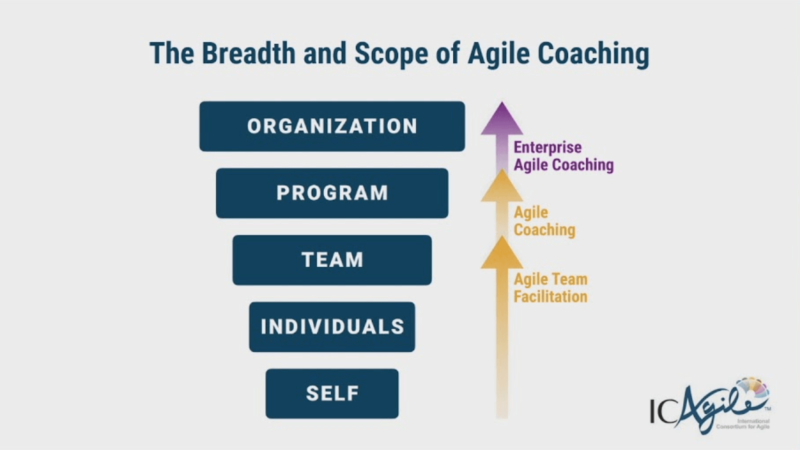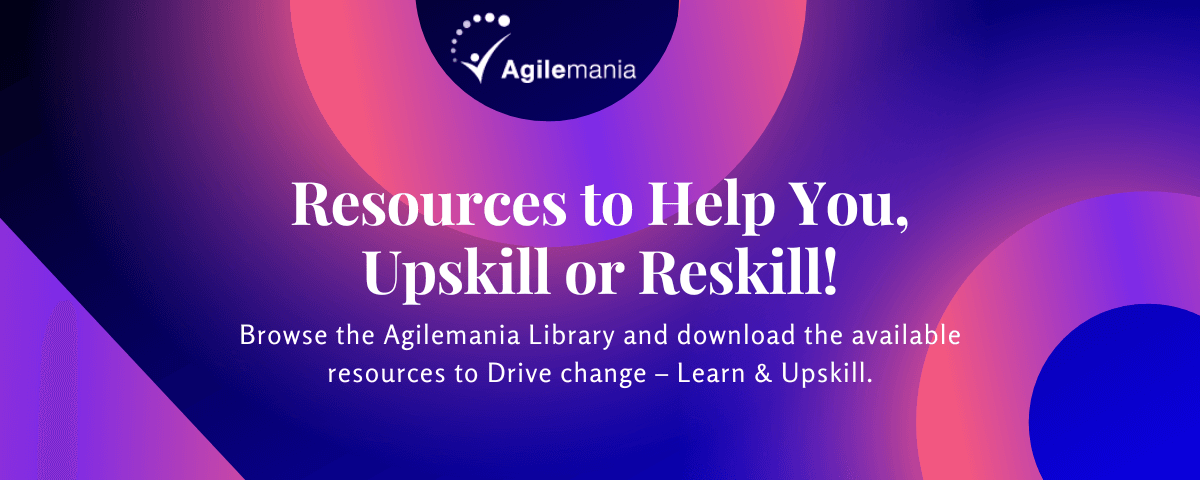
Agilemania
Agilemania, a small group of passionate Lean-Agile-DevOps consultants and trainers, is the most tru... Read more
No courses found...
No courses found...

Agilemania
Agilemania, a small group of passionate Lean-Agile-DevOps consultants and trainers, is the most tru... Read more

Agile and Scrum are the two most famous names in the industry. Both are easy to understand but hard to apply. Unfortunately, most organizations think all Agile frameworks come with a one-size-fits-all approach. As a result, they set unrealistic expectations when using Agile practices in their organizations. And the consequence?
According to Zippia Research, the US government has lost $32 billion because of failed IT projects. From the stats above, it's clear that most issues come when organizations don't know how and when to implement Agile Practices. This is where it becomes essential to get help from an Agile Coach. But which Agile Coach should you choose to drive growth? Agile or Enterprise?
Well, we've researched for you and curated a list of differences between an Agile Coach and an Enterprise Agile Coach. So, stick to the end of the article to find out which coaching type should fit your organizational requirements.
An Agile Coach helps create and follow Agile processes within an organization or multiple teams. Be it a team of marketing, IT, HR, sales, or development, an Agile Coach guides them to improve performances and deliver value. Think of an Agile Coach as a trainer or mentor who works with a team to help them implement
Agile practices in project management or software development. For example, they teach the team to facilitate sprint planning meetings, conduct retrospectives, recognize roadblocks, and develop solutions. In short, an Agile Coach aimsCoach's to help organizations or multiple groups improve their Scrum process for fast and quality results. You can be an Agile Coach for your software development, project management, product management, or IT background.
However, to be an expert Agile Coach, you should have good knowledge of various Agile methods, for instance- Scrum, Kanban, and SAFe.
The role of an Agile Coach may have different names. They are sometimes called Scrum masters, Agile consultants, kanban coaches, or Agile facilitators. Whatever their role name is, they are primarily responsible for implementing Agile practices at a team level and throughout the organization. For example, suppose you want to be an Agile Coach.
In that case, these are some typical responsibilities you’ll handle to ensure the Agile teams or departments are included in the broader processes and plans of the organization.
To sum up, Agile Coaches are responsible for helping organizations adopt Agile at a team level. They can work with the Agile Team to manage their Agile processes and provide feedback for improvement. They can also help reduce dependencies and resistance from top management due to reduced control.
An Enterprise Agile coach is a person who is responsible for implementing business agility throughout a large organization or enterprise. An Agile Enterprise's skills and knowledge are similar to an Agile Coach. The only difference is an Enterprise Agile coach helps with Agile transformation at an enterprise level. This means an Enterprise Agile Coach will train managers and employees of large-scale governance structures.
The role of an enterprise-level Agile Coach is more senior and strategic. And they often have to work closely with C-level executives and leaders of enterprises.
An Enterprise Agile coach must have prior experience as an Agile team coach or facilitator. Along with the knowledge of Scrum and Agile, they should have a good understanding of Scaled Agile Framework (SAFe), Large-scale Scrum (LeSS), and Disciplined Agile Delivery (DaD).
Unlike Agile Coaches, Enterprise Agile Coaches are less involved in implementing Agile at the team level. However, they must be able to visualize an organizational transformation from a broader business perspective. That means they are more concerned with changing the overall structure of the organization to apply Agile principles.
If you want to become an Enterprise Agile Coach, these are some responsibilities you need to handle:
So, Agile Enterprise Coaches have specific skill sets and knowledge to bring organizational and cultural changes. They can work with people at every level. They have a solid understanding of all the Agile Frameworks and can deploy their expertise across the entire organization.

Agile Coach and Enterprise Agile Coach aren’t completely different concepts. They are part of Agile Methodology and the three levels of Agile coaching. According to Lyssa Adkins, the three levels of Agile coaching are Team Facilitator, Agile Coach, and Enterprise Agile Coach.
That means Agile Coach and Enterprise Coach are dependent on each other.
You can’t be can't Enterprise Coach without being an Agile coach.
However, the main difference between an Agile Coach and an Enterprise Agile Coach is the scope and focus of their work. An Agile Coach typically works with a small organizational team or individuals to help them adopt Agile practices.
On the contrary, Enterprise Agile Coaches work with large organizations to help implement Agile as a strategic business asset and improve the organizational structure through multiple teams and departments.
An Agile Coach focuses on cross-functional team collaboration. Enterprise Agile Coach focuses on portfolios using Agile methods like Agile Portfolio Management.
Agile Enterprise Coach also focuses on improving the business agility of an entire enterprise.
Enterprise Agile Coach closely works with Directors, Executives, Vice Presidents, and other leaders. Whereas, Agile coach mainly works with Scrum Masters, Product Owners, etc. Now that you have the main differences between these two coaching types in the Agile world let’s take a look at some of the similarities:
As mentioned earlier in this post, both coaches(Agile & Enterprise) depend on each other. So, you need both coaches if your organization considers transforming to Agile and driving business agility.
An Enterprise Agile Coach will help your company strategically drive business agility. But, without taking guidance from an Agile coach, you can’t encourage your company’s company to execute those strategies.
And this will lead to a failure in Agile transformation.
So, we recommend getting help from both coaches at once.
And if you’re still confused about which coach you should pursue first, here’s a link to help you out:
You can pursue any coaching certification if it suits your skills and interests. For example, if you get an Enterprise Agile Coach certification, you should have in-depth knowledge of organizational design, culture, business strategies, etc.
Also, you should have the skills to work with leaders and executives. Enrolling in an Enterprise Agile Coaching program would be perfect if you’re a Syou'reaster, Agile Coach, change agent, or senior management professional.
As Agile is slowly becoming mainstream, the demand for Agile Coaches is rising. Organizations need coaches' expertise to help them transform their businesses and drive growth and agility. Organizations must understand that agile and Enterprise Agile Coaches are necessary for success.
While Agile coaches work at a team or individual level, Enterprise Agile Coaches work at the enterprise level. Agile Coaches help to facilitate Agile through teams and departments, whereas an Enterprise Agile Coach manages organizational culture and structure change.
Despite their differences, organizations should find a way to work with both types of coaches at different levels. By doing so, they can accomplish a more effective Agile transformation.
Lastly, if you want you're a certified Agile Coach, we are here to help you. Along with all the certification and expertise, at Agilemania, you’ll get in-depth you'll learn about Agile Transformation. Transformational Strategies, Change Processes and Facilitating Sustainable Change across Organizations.
So, what’s the wait? Get what's with us today!
Agilemania, a small group of passionate Lean-Agile-DevOps consultants and trainers, is the most trusted brand for digital transformations in South and South-East Asia.
WhatsApp Us

We will get back to you soon!
For a detailed enquiry, please write to us at connect@agilemania.com



